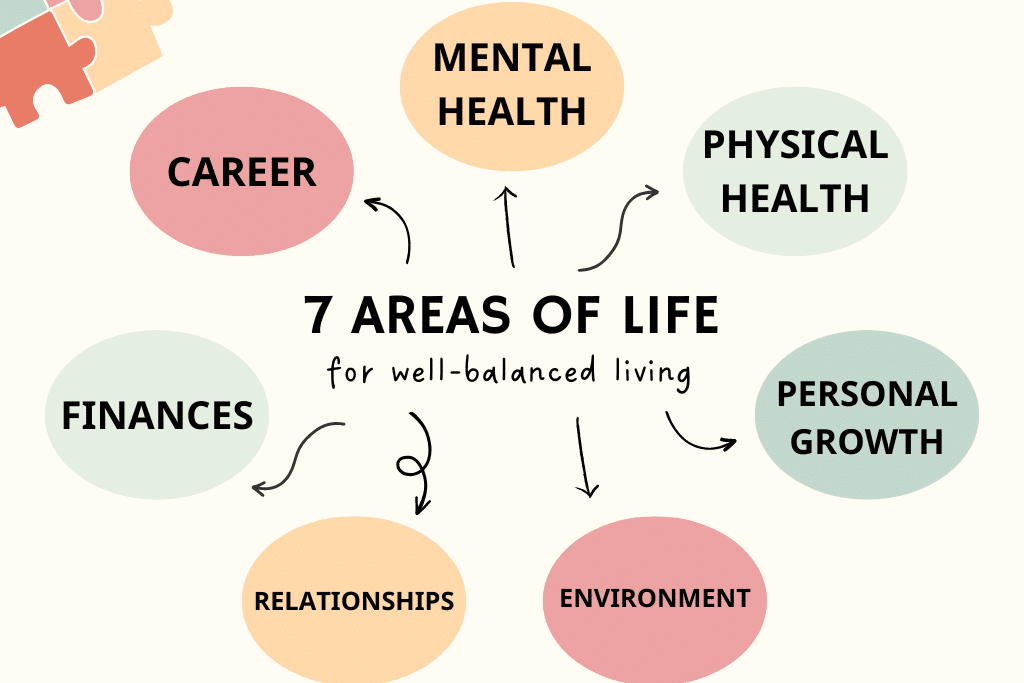30 Goals to Improve Your Life in Different Ways
Setting goals isn’t just about making New Year’s resolutions on January 1st. It’s about continuously reflecting on what you want out of life and creating steps to achieve those desires over time. These goals can cover various areas of life, including finances, career, health, relationships, and personal development. Here are 30 Goals to Improve Your Life in Different Ways.

Financial Goals
1. Create or Rebuild Your Emergency Fund
An emergency fund is essential because it provides financial security during unexpected situations, like job loss or medical emergencies. Aim to save enough to cover 3 to 6 months of basic living expenses, such as food, housing, transportation, and utilities. If this seems overwhelming, start small by saving your first $1,000 and gradually build up from there.
2. Create a Monthly Budget
A budget is a financial plan that helps you track your income and expenses. It allows you to see where your money is going and identify areas where you can save. There are various budgeting methods, such as the 50/30/20 rule (50% needs, 30% wants, 20% savings/debt repayment) or zero-based budgeting, where every dollar is assigned a job.
3. Start a Side Job for Extra Income
Having a side job can provide additional income to pay off debt, increase savings, or achieve specific financial goals. Consider options like freelance writing, tutoring, selling handmade items online, or even driving for a ride-share service. Choose something that aligns with your skills and interests.
4. Contribute More to Your Retirement Accounts
The earlier you start saving for retirement, the more time your money has to grow. If you haven’t started yet, open a retirement account, such as a 401(k) or IRA. If you already have one, try to increase your contributions, even if it’s just by a small percentage each year. This will help you achieve financial freedom sooner.
5. Try a No-Spend Challenge
A no-spend challenge involves cutting out all non-essential spending for a set period, such as a week or a month. This means only spending money on necessities like rent, utilities, groceries, and gas. The goal is to save money and become more aware of your spending habits. Start with a short-term challenge and gradually extend the duration.
ALSO READ: Save Money, Live Better: 10 Tips that act as a Blueprint for Success in Life
Career Goals
6. Learn New Professional Skills
Continuously learning and improving your skills is crucial for career growth. This could involve taking online courses, attending workshops, or earning certifications in your field. By enhancing your skill set, you’ll stay competitive and be better prepared for promotions or job changes.
7. Apply for a Promotion
Don’t wait for promotions to come to you. Be proactive about your career advancement by expressing your interest to your manager and asking what you need to do to get to the next level. Show your value through your work and seek feedback on areas for improvement.
8. Create or Update Your Website and Resume
Having an up-to-date resume and a personal website showcasing your work can help you stand out to potential employers. A website acts as your professional portfolio where you can highlight projects, skills, and achievements. Regularly updating your resume ensures it’s ready whenever a new opportunity arises.
9. Strive for a Healthy Work-Life Balance
Maintaining a balance between work and personal life is essential to avoid burnout. Set boundaries, such as not checking work emails after a certain time and taking regular breaks throughout the day. Make sure to allocate time for hobbies, exercise, and spending time with loved ones.
10. Network in Your Industry
Building a network of professional contacts can open doors to new opportunities, mentorship, and career growth. Attend industry events, join professional organizations, and connect with colleagues on social media platforms like LinkedIn. Networking can also help you stay updated on industry trends and best practices.
Health Goals
11. Focus on Fresh, Clean Eating
Eating a diet rich in whole, unprocessed foods can improve your overall health and energy levels. Plan your meals ahead of time and prepare them at home to avoid the temptation of fast food. Incorporate a variety of fruits, vegetables, lean proteins, and whole grains into your diet.
12. Spend More Time in Nature
Spending time outdoors has numerous benefits for mental and physical health, including reducing stress and improving mood. Explore local parks, hiking trails, or beaches. Activities like walking, jogging, or simply sitting outside and enjoying the fresh air can be incredibly rejuvenating.
13. Find an Exercise Routine You Love
Regular physical activity is crucial for maintaining health and well-being. Find an exercise routine that you enjoy, whether it’s dancing, swimming, cycling, or practicing yoga. The key is to make it a regular part of your routine, so you look forward to it rather than see it as a chore.
14. Practice Good Sleep Hygiene
Good sleep hygiene involves creating a conducive environment and routine for sleep. Aim for 7-9 hours of sleep each night and establish a regular sleep schedule. Create a relaxing bedtime routine, avoid caffeine and electronics before bed, and ensure your sleeping environment is cool, dark, and quiet.
Relationships Goals
15. Learn the Love Languages
Understanding the five love languages—words of affirmation, quality time, physical touch, acts of service, and receiving gifts—can help improve your relationships. By learning your partner’s love language, you can better express your love and appreciation in a way that resonates with them.
16. Practice Positivity and Gratitude
Expressing gratitude and positivity towards the people in your life can strengthen your relationships. Make it a habit to regularly thank your loved ones for the little things they do and remind them of their value in your life. This can create a more positive and supportive environment.
17. Improve Communication Skills
Effective communication is key to any healthy relationship. Work on your listening skills, express your thoughts and feelings clearly, and be open to feedback. Learning to navigate conflicts constructively can also lead to stronger, more resilient relationships.
18. Spend Quality Time with Loved Ones
Make time to connect with the important people in your life. Plan regular activities or outings together, whether it’s a family dinner, a weekend trip, or simply a movie night at home. Quality time helps build stronger bonds and creates lasting memories.
19. Set Boundaries
Setting boundaries in relationships is essential for maintaining your mental health and well-being. Communicate your limits clearly and stick to them. This could involve saying no to certain requests, taking time for yourself, or limiting interactions with toxic individuals.
Personal Development Goals
20. Read More Books
Reading is a great way to expand your knowledge, stimulate your mind, and improve your empathy. Set a goal to read a certain number of books this year. Choose a mix of genres, including fiction, non-fiction, self-help, and biographies, to gain diverse perspectives.
21. Pursue a New Hobby
Trying out new hobbies can be fulfilling and enriching. Whether it’s painting, gardening, learning a musical instrument, or cooking, find something that excites you and dedicate time to it. Hobbies can provide a creative outlet and a sense of accomplishment.
22. Volunteer and Give Back
Volunteering can help you connect with your community and make a positive impact. Find a cause you’re passionate about and commit time to it. This could involve helping at a local food bank, participating in environmental clean-ups, or mentoring youth.
23. Practice Mindfulness and Meditation
Mindfulness and meditation can improve your mental clarity and reduce stress. Incorporate these practices into your daily routine, even if it’s just for a few minutes each day. Techniques like deep breathing, body scanning, and guided meditation can be beneficial.
24. Set Personal Goals
In addition to the above goals, set personal goals that are meaningful to you. This could involve learning a new language, traveling to new places, or achieving a personal fitness milestone. Having personal goals gives you a sense of purpose and direction.
25. Declutter Your Space
A clutter-free environment can reduce stress and increase productivity. Take time to declutter your home and workspace. Organize your belongings, get rid of items you no longer need, and create a clean and inviting space.
26. Focus on Self-Care
Self-care involves taking time to care for your physical, mental, and emotional well-being. This could include activities like taking a relaxing bath, journaling, practicing yoga, or simply taking a break when you need it. Prioritize self-care to recharge and prevent burnout.
27. Set a Morning Routine
A structured morning routine can set a positive tone for the rest of the day. Include activities that energize and inspire you, such as exercising, meditating, reading, or planning your day. A consistent morning routine can improve productivity and overall well-being.
28. Develop a Growth Mindset
A growth mindset is the belief that you can develop your abilities through dedication and hard work. Embrace challenges, learn from criticism, and persist in the face of setbacks. A growth mindset fosters resilience and a love for learning.
29. Improve Time Management
Effective time management can help you achieve more in less time and reduce stress. Use tools like calendars, to-do lists, and time-tracking apps to organize your tasks and prioritize your activities. Learning to manage your time well can lead to greater productivity and work-life balance.
30. Practice Financial Literacy
Understanding financial concepts and managing your finances effectively is crucial for achieving financial stability. Take time to learn about budgeting, investing, saving, and debt management. Resources like books, online courses, and financial advisors can provide valuable insights.
Conclusion
Setting yearly goals across different dimensions of your life can lead to significant improvements in your overall happiness and satisfaction. Reflect on what matters most to you and take actionable steps toward achieving these goals throughout the year. Remember, goal-setting is an ongoing process, and it’s okay to adjust your goals as you grow and evolve. Start with small, manageable steps and celebrate your progress along the way.




